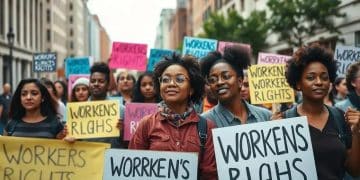Cause press freedom watch: Why it matters today

Supporting press freedom initiatives is essential for democracy, as it ensures journalists can report freely without fear, allowing for transparency, accountability, and the protection of human rights.
Cause press freedom watch draws attention to the crucial role that a free press plays in nurturing democracy and informing society. Without a vigilant and independent press, how can we ensure that voices are heard and accountability is upheld? This article delves into the nuances and importance of press freedom today.
Understanding the concept of press freedom
Understanding press freedom is essential for appreciating its role in democracy. A free press informs the public about important issues, helps hold leaders accountable, and fosters informed debate. It’s not just about the right to publish; it’s about the responsibility that comes with it.
The Importance of Press Freedom
A society that values press freedom sees a greater engagement from its citizens. When journalists can report without fear, they shine a light on corruption, societal issues, and government actions. This transparency is crucial for a functioning democracy.
Key Elements of Press Freedom
Press freedom consists of several core elements:
- Independence: Media should operate free from government control or influence.
- Access to Information: Journalists must have the right to gather information from various sources without obstruction.
- Accountability: Media should be accountable to the public and adhere to ethical reporting standards.
- Protection: Journalists need legal protections to safeguard them from harassment and persecution.
Without these elements, press freedom is compromised. When journalists can’t operate freely, misinformation can spread, and the public remains uninformed. This leads to a cycle of disinformation and a weakened democracy.
Moreover, the digital age has introduced new challenges and opportunities for press freedom. Social media can amplify voices and stories that might be silenced in traditional media. However, it also raises concerns about censorship and the spread of fake news.
Advocating for press freedom means supporting initiatives and policies that protect journalists. By doing so, we foster a culture of transparency and accountability, ensuring that everyone’s voice can be heard.
The current state of press freedom globally

Understanding the current state of press freedom globally is vital for recognizing the challenges journalists face. Around the world, press freedom varies significantly, reflecting the political and social conditions in different countries.
Global Perspectives on Press Freedom
Regions like Europe often enjoy robust press freedom, while others face restrictions. For instance, in countries like Norway and Finland, journalists can operate freely without government interference. However, nations such as North Korea and China impose severe censorship, stifling any dissenting voices.
Challenges to Press Freedom
Several factors threaten press freedom today:
- Censorship: Governments may block or limit access to information, affecting journalists’ ability to report.
- Violence Against Journalists: Reporters often face threats or physical harm while covering sensitive topics.
- Misinformation: The spread of false information complicates the media landscape, making it difficult for credible journalism to thrive.
- Legal Restrictions: Harsh laws can be used to silence journalists and prevent them from doing their work.
As we examine this landscape, it’s clear that press freedom is under threat in many regions. Journalists serve as crucial watchdogs, yet they face increasing adversity when trying to inform the public effectively.
Countries are beginning to recognize the importance of a free press for democracy. Some initiatives aim to enhance journalists’ protections. However, significant work remains to ensure every reporter can work freely worldwide. In some countries, activists advocate for better protections and more transparency in media laws.
This struggle is ongoing, and awareness is key. Supporting press freedom helps create a more informed and engaged society, which is essential for democracy.
Challenges faced by journalists today
Journalists today face many significant challenges that can hinder their ability to report freely and accurately. As the media landscape evolves, new obstacles arise, impacting how news is produced and consumed.
Physical Threats
One of the most pressing challenges is the risk of physical harm. Journalists often cover dangerous events, such as protests, wars, or natural disasters. In some regions, they face threats of violence, which can discourage reporting on crucial issues.
Censorship and Legal Restrictions
Censorship is another major hurdle for journalists attempting to provide complete coverage. Some governments impose strict regulations that limit what can be reported. Reporters may also face legal actions that threaten their ability to share information.
- Content control: Governments may restrict access to certain subjects or manipulate the news agenda.
- Defamation laws: Reporters can be sued for defamation, which stifles criticism and accountability.
- Surveillance: Increased surveillance makes journalists wary of their communications.
- State-owned media: In some countries, state control of media outlets limits diverse perspectives.
Moreover, the rise of technology has changed how news is consumed. Social media platforms allow rapid sharing of news but also spread misinformation. This creates a chaotic environment where distinguishing credible news from fake news becomes challenging.
Journalists are also coping with financial pressures. Many news organizations struggle with sustainability due to declining revenues. This can lead to layoffs or cutbacks in investigative reporting, which is essential for democracy.
Despite these challenges, the role of journalists remains vital. They provide essential scrutiny of power and inform the public about key issues. Protecting their rights and safety is crucial for maintaining a healthy media environment.
How to support press freedom initiatives

Supporting press freedom initiatives is crucial for maintaining democratic values and ensuring that information flows freely in society. Many organizations work tirelessly to protect journalists and promote the rights of the press.
Become Informed
The first step in supporting press freedom is to educate yourself about the issues facing journalists. Understanding the challenges they encounter can help raise awareness among your community. Many resources are available online, including reports from advocacy groups and news articles highlighting ongoing struggles for press freedom around the world.
Support Journalism Organizations
Many organizations are dedicated to defending press freedom:
- Committee to Protect Journalists (CPJ): This group works to protect journalists from harassment and violence.
- Reporters Without Borders (RSF): They promote press freedom globally and provide support for threatened journalists.
- Freedom of the Press Foundation: They work to protect whistleblowers and support independent journalism.
- International Press Institute (IPI): They advocate for press freedom and provide training to journalists.
Donating to these organizations or participating in their campaigns can make a significant impact in their efforts to protect journalism.
Additionally, you can support local journalism by subscribing to newspapers or news outlets. This helps ensure that local reporters can continue their work in the community. Attending community events and discussions on press freedom also raises awareness and brings like-minded people together.
Speaking out against censorship whenever you encounter it is another way to show support. Use your voice on social media to advocate for journalists facing threats and share stories about press freedom. In doing so, you can increase visibility for these important issues and help create a culture of support for independent journalism.
Ultimately, every action counts, whether it’s starting conversations about press freedom in your network or engaging with organizations that champion these values. Your support can help create a safer environment for journalists and ensure that vital information continues to be shared.
\n
| Action | Description |
|---|---|
| 📚 Educate Yourself | Learn about press freedom issues to raise awareness. |
| 💰 Support Organizations | Donate to groups that protect journalists and their rights. |
| 📰 Subscribe Locally | Help sustain local journalism by subscribing to outlets. |
| 📣 Speak Out | Use social media and conversations to advocate for press freedom. |
| 🤝 Join Community Events | Participate in discussions and rallies to show support. |
\n
\n
FAQ – Frequently Asked Questions about Supporting Press Freedom Initiatives
Why is press freedom important?
Press freedom is crucial for democracy as it allows journalists to report without fear, helping to hold power accountable and inform the public.
How can I support local journalism?
You can support local journalism by subscribing to local newspapers and news outlets, which enables them to operate and cover community issues.
What organizations work to protect press freedom?
Organizations like Reporters Without Borders and the Committee to Protect Journalists work to defend the rights of journalists and promote press freedom globally.
How can I raise awareness about press freedom issues?
You can raise awareness by sharing articles, participating in discussions on social media, and attending events focused on press freedom.





